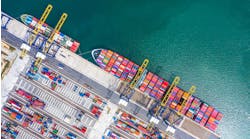A recent international survey revealed that 81% of companies are focusing more on sustainability today than they did three years ago, and that their supply chains are playing a crucial role in these efforts by owning sustainable initiatives across their networks.
The survey was conducted by Coyote Logistics, a global third-party logistics (3PL) provider, in partnership with Martec. a market research firm. About 250 global shippers across various industries, company sizes, verticals and seniority levels were polled about how they are approaching sustainability and where they see the greatest opportunities to do more.
“Sustainable practices and operations are now the expectation among customers and key stakeholders,” said Mike Sinkovitz, senior vice president of Coyote Transportation Management. “As a result, supply chain professionals need to prioritize these initiatives across their entire networks to achieve continued success.”
Earlier this year, Larry Fink, CEO of BlackRock, a financial asset manager, published an open letter stating that climate change is now a defining factor in companies’ long-term prospects, and in fact, the top issue raised by their clients. He challenged his CEO peers to start implementing sustainability initiatives at their companies and disclosing information on their progress for the public and investors.
Such exhortations are reaching an audience of corporate leaders where many already have embarked on taking action. In fact, Coyote’s study found that the trend towards sustainability within the supply chain is dominant among companies of all sizes, and the same is true across different verticals. “Without a commitment to supply chain sustainability, companies will not be able to compete in the years to come,” the 3PL asserted.
In the poll, when respondents were asked about their personal buying habits, 58% said they are either likely or extremely likely to purchase a product or service from a brand based on their sustainability practices, while another 26% said they are somewhat likely to be influenced. Not a single respondent said that sustainability practices would make them unlikely to buy from a company.
The executives surveyed also said they were overwhelmingly inclined to purchase products or services from brands that operate in ways seen as being more favorable to the environment, including in their approaches to supply chain management.
In fact. 84% of respondents were more likely to base a purchase decision on a brand’s sustainability practices.
In addition, 77% of companies with revenues between $1 million and $199 million have increased their focus on sustainability within the past three years. Other research shows that 71% of small- and medium-sized businesses have taken (or are starting to take) steps towards sustainability.
“This reinforces the importance of green practices for consumers and the acknowledgment of this trend among shippers,” Coyote said. “This common commitment reinforces that, regardless of company size or industry, sustainability is here to stay. As organizations look to implement change in their own networks, they need the collective support of all business areas, often with supply chain at the forefront of these initiatives.”
A manager of supply chain at a U.S. paper and packaging company who participated in the survey stated, “We set long-term goals, as that appears to be the way of the industry. Right now, we are planning about five years out.”
The manager of logistics at an industrial goods shipper explained, “We have both short-term and long-term goals. The short are around small improvements, such as measuring drivers’ idle time. The long include overall fuel choices for fleets.” The vice president of supply chain for a pharmaceuticals company said, “Our goal is to switch to 100% alternative fuels in five years.”
Companies also are using key performance indicators (KPIs) to track the effectiveness of their overall sustainability program. Global shippers are most actively measuring fuel efficiency (69% of respondents); CO2 emissions (60%); alternative fuel use (52%); personnel skills related to sustainability (48%); and fleet age (46%).
Some supply chains also are measuring particulate matter, NOX (nitrogen oxides), electricity use, recycling efforts and trailer utilization, but these are less common.
Among the different industry segments, automotive was found to be the front runner, with 93% of supply chain professionals in that industry noting an increased commitment to sustainability. Other leading industry segments include food & beverage, industrial goods and technology, each with 85% of supply chain managers involved in these efforts.
Recruiting Others
“We are assessing existing business-critical suppliers and service providers and removing those who don’t meet our sustainability standards,” the vice president of supply chain at a consumer goods company told the researchers.
The director of supply chain at a retail company said, “We strive for extensive collaboration with key players across our supply chain, including manufacturing, retailers, transportation and warehousing. We set scientific targets and track goal progress.”
With the explosion of e-commerce over the past decade, consumers have gotten used to fast and free delivery. Next-day delivery is now the gold standard, and same-day delivery is often possible, Coyote noted.
However, consumer loyalty based on sustainable efforts also has been clearly demonstrated, with 61% of consumers citing their willingness to wait longer for the delivery of their purchases if they know it’s better for the environment. Despite this change in attitude, same-day and next-day delivery options are still commonplace.
It is up to companies to make better supply chain decisions, report on their impact and communicate it to the consumer, Coyote argued. “The study’s data clearly outlined this juxtaposition between consumers’ desire for quick deliveries and sustainable shipping practices. Delivering on both requires a holistic, collaborative effort from all members of the supply chain,” Sinkovitz pointed out.
Due to increased demand for more environmentally-friendly products and services, a focus on supply chain sustainability is considered critical—98% of global shippers now have at least one team member dedicated to green initiatives.
However, only 25% take it a step further and require information on sustainability within their request for proposals, which Coyote says shows a lack of consensus on how to plan for and measure performance.
“A focus on supply chain sustainability is almost mandatory at this point, but we haven’t yet come to a consensus on how that can and should apply to procurement,” Coyote said.
The supply chain has “woken up” to the fact that sustainability should be prioritized if lasting success is to be achieved, the 3PL added. Companies reported sustainability practices generated a return on investment (ROI) based on key performance indicators, which included cost savings (67%), benefits to company reputation (59%) and reflection of industry leadership (52%), among others.
“We are using green logistics to cut costs and win customers,” commented one director of supply chain at a food and beverage company who participated in the survey.
Coyote said, “With more global shippers having dedicated team members focused on sustainability initiatives and 81% being more focused on these efforts than they were three years ago, it is apparent the need is being recognized. Supply chain professionals are building long-term sustainability goals that they expect to meet within the next four to five years.”
But making it a priority is essential to meeting goals in the future, the company added. “Whether members of the supply chain have already implemented environmentally-friendly practices or they’re just getting started, prioritizing sustainability is going to be critical to achieve continued success.”
In the current landscape, 98% of shippers have at least some kind of sustainability program, but only 71% have measurable goals, the poll found. The takeaway, Coyote said, is that “to be successful, supply chain leaders should develop clearly defined short- and long-term goals, have a way to measure them and critically evaluate their effectiveness.”
The good news: That is exactly what most supply chain professionals are already doing, according to the survey. More than half of all respondents said they have longer term sustainability goals that they expect to meet within the next four to five years (although this is more prevalent in Europe than in the United States).
“The global supply chain has ‘woken up’ to the fact that sustainability is not a trend, but a priority that needs to be an integral part of any sound strategy,” Coyote concluded.




